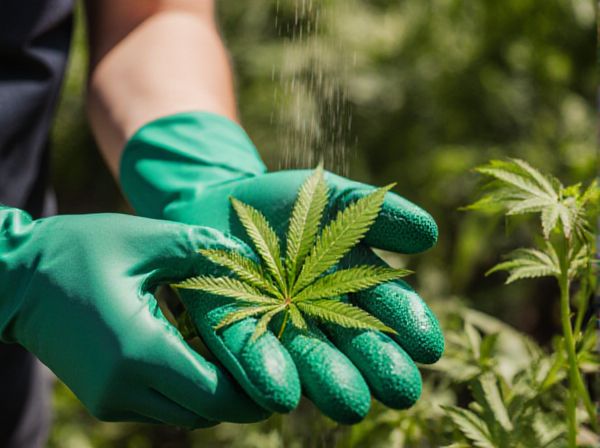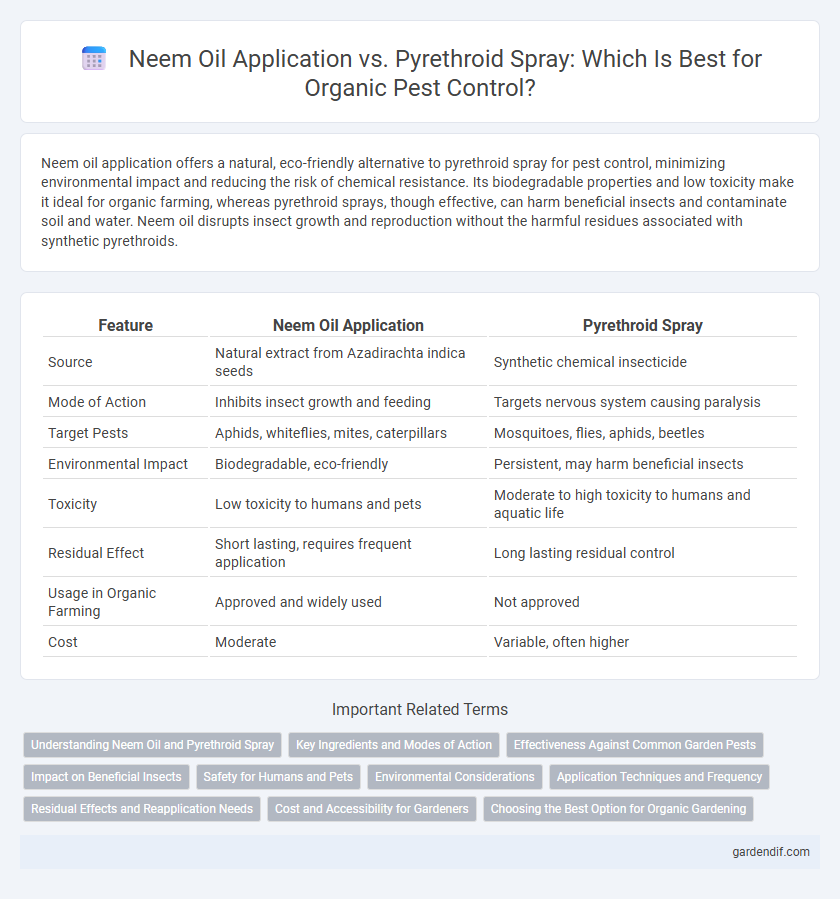
Neem oil application vs Pyrethroid spray Illustration
Neem oil application offers a natural, eco-friendly alternative to pyrethroid spray for pest control, minimizing environmental impact and reducing the risk of chemical resistance. Its biodegradable properties and low toxicity make it ideal for organic farming, whereas pyrethroid sprays, though effective, can harm beneficial insects and contaminate soil and water. Neem oil disrupts insect growth and reproduction without the harmful residues associated with synthetic pyrethroids.
Table of Comparison
| Feature | Neem Oil Application | Pyrethroid Spray |
|---|---|---|
| Source | Natural extract from Azadirachta indica seeds | Synthetic chemical insecticide |
| Mode of Action | Inhibits insect growth and feeding | Targets nervous system causing paralysis |
| Target Pests | Aphids, whiteflies, mites, caterpillars | Mosquitoes, flies, aphids, beetles |
| Environmental Impact | Biodegradable, eco-friendly | Persistent, may harm beneficial insects |
| Toxicity | Low toxicity to humans and pets | Moderate to high toxicity to humans and aquatic life |
| Residual Effect | Short lasting, requires frequent application | Long lasting residual control |
| Usage in Organic Farming | Approved and widely used | Not approved |
| Cost | Moderate | Variable, often higher |
Understanding Neem Oil and Pyrethroid Spray
Neem oil, derived from the Azadirachta indica tree, acts as a natural insecticide and fungicide by disrupting insect growth and feeding patterns, making it ideal for organic pest control. Pyrethroid sprays, synthetic chemicals modeled after pyrethrins found in chrysanthemum flowers, provide rapid knockdown of a broad spectrum of pests but may pose risks to beneficial insects and human health. Understanding the mode of action, environmental impact, and safety profile of both treatments helps optimize pest management strategies in organic and conventional agriculture.
Key Ingredients and Modes of Action
Neem oil contains azadirachtin, which disrupts insect hormone systems and inhibits feeding, resulting in growth deterrence and reproductive failure in pests. Pyrethroid sprays contain synthetic pyrethrins that target the insect nervous system by altering sodium channel function, causing paralysis and rapid mortality. Neem oil's botanical origin offers biodegradability and lower toxicity, while pyrethroids provide fast-acting knockdown effects but pose higher risks to non-target organisms and environmental persistence.
Effectiveness Against Common Garden Pests
Neem oil exhibits broad-spectrum efficacy against common garden pests such as aphids, whiteflies, and spider mites by disrupting their hormonal systems and inhibiting feeding behaviors. Pyrethroid sprays act rapidly by targeting the nervous system of insects, offering quick knockdown effects but often leading to resistance development in pest populations over time. Studies indicate neem oil provides longer-lasting pest control with lower environmental toxicity, making it a preferred option for sustainable organic gardening.
Impact on Beneficial Insects
Neem oil demonstrates selective toxicity by effectively targeting pests while preserving beneficial insects such as pollinators and natural predators, thereby supporting ecological balance and sustainable pest management. Pyrethroid sprays, characterized by broad-spectrum insecticidal properties, often cause significant harm to beneficial insect populations, disrupting their roles in pest control and pollination. Employing neem oil in organic farming enhances biodiversity and reduces the risk of resistance compared to the indiscriminate use of pyrethroid insecticides.
Safety for Humans and Pets
Neem oil, derived from the neem tree, offers a safer alternative to pyrethroid sprays for pest control, posing minimal risk to humans and pets due to its natural origin and low toxicity. Pyrethroid sprays, synthetic chemicals known for their neurotoxic effects, can cause respiratory irritation and skin sensitization, raising safety concerns in household environments. Organic farmers and pet owners prefer neem oil for effective pest management without compromising human and animal health.
Environmental Considerations
Neem oil, derived from the Azadirachta indica tree, offers a biodegradable and eco-friendly alternative to synthetic pyrethroid sprays, minimizing harmful residues in soil and water. Its targeted insecticidal properties reduce non-target organism impact, preserving beneficial insect populations essential for ecosystem balance. Pyrethroid sprays, while effective, pose risks of bioaccumulation and toxicity to aquatic life, prompting concerns over long-term environmental contamination.
Application Techniques and Frequency
Neem oil application requires thorough coverage and is typically applied every 7 to 14 days to maintain efficacy against pests, leveraging its systemic and repellent properties. Pyrethroid spray demands more precise timing, often applied every 10 to 14 days, with careful adherence to recommended dosage to minimize resistance development. Both methods benefit from targeting early infestation stages and avoiding peak heat for optimal absorption and effectiveness.
Residual Effects and Reapplication Needs
Neem oil exhibits a prolonged residual effect due to its systemic and slow-release properties, reducing the frequency of reapplication compared to pyrethroid sprays. Pyrethroid sprays provide rapid knockdown but degrade quickly under sunlight and rain, necessitating more frequent applications to maintain effectiveness. The extended residual activity of neem oil makes it a preferred choice for organic pest management requiring fewer treatments over time.
Cost and Accessibility for Gardeners
Neem oil offers organic gardeners a cost-effective and readily accessible pest control option, often available at local garden centers and online stores, with prices typically lower than synthetic pyrethroid sprays. Pyrethroid sprays, while effective, tend to be more expensive and may require special handling or equipment for safe application, limiting accessibility for casual or small-scale gardeners. The organic nature of neem oil aligns with sustainable gardening practices, making it a preferred choice for cost-conscious gardeners seeking eco-friendly pest management solutions.
Choosing the Best Option for Organic Gardening
Neem oil offers a natural, biodegradable solution with broad-spectrum pest control and minimal impact on beneficial insects, making it ideal for organic gardening. Pyrethroid sprays, while effective against various pests, are synthetic chemicals that can harm non-target organisms and disrupt soil health. Choosing neem oil aligns better with organic certification standards and promotes sustainable pest management through safer, eco-friendly application.
Neem oil application vs Pyrethroid spray Infographic

 gardendif.com
gardendif.com